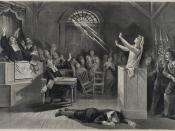The Crucible
Greed and private motives are considered to be commonplace in our society today. Several people who are driven by these infamous factors generally end up hurting themselves and the people around them. Several examples of extreme situations of greed and personal motives lie in the past. The list ranges from the gold-seeking explorers in the 1500's to the genocide in the Middle East nowadays. One particular example of the implication of private motives is the Salem witch trials. Arthur Miller wrote a book during the McCarthy era expressing these horrid events. In Arthur Miller's The Crucible, Reverend Parris, Thomas Putnam, and Abigail Williams have personal motives, which have consequences that extend far beyond their own lives and onto the lives of other Salemites.
Reverend Parris' motives were part of the reason for the outbreak of hysteria in Salem. Parris was so concerned about his own well-being and status in society that he went along with the witch trials even though he knew they were wrong.
For his own selfish reasons, he started agreeing with Abigail Williams about people being possessed by the Devil and started accusing innocent people of witchcraft. Furthermore, when John Proctor come to the courtroom to give Judge Danforth a testament signed by ninety-one people, Parris immediately accuses Proctor of trying to "?overthrow the court." Parris was so afraid of being found out of his devious ways, that he tried to shift the blame to Proctor. Eventually, due to Parris and some girls, Proctor was convicted of witchcraft and sentenced to death. Parris' personal motivation about his reputation caused him to falsely accuse other people to save himself.
Thomas Putnam's greed and private motivation were part of the reasons that the trials continued to go on for so long. Thomas Putnam...



The Crucible
This is a well-balanced piece with good detail that is clearly written and well-presented.
Arthur Miller's story is a classic study of small-minded paranoia with frightening consequences.
2 out of 2 people found this comment useful.